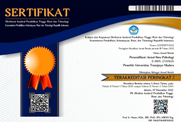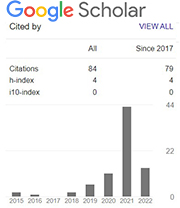Kebermanfaatan: Sebuah Gambaran Work Engagement Pada Hakim
Abstract
Keywords
Full Text:
PDF (Bahasa Indonesia)References
Agustiningsih, & Wardaningsih, S. (2022). Upaya dan Penatalaksanaan Perubahan Psikososial di Masa Pensiun: Literature Review. Jurnal Ilmu Keperawatan Jiwa, 5(1). https://journal.ppnijateng.org/index.php/jikj
Aras, R, A. & Helmi, A, F. (2014). Peran Iklim Organisasi terhadap Work Engagement dengan Optimisme sebagai Mediator. (Tesis tidak dipublikasikan). Fakultas Psikologi Universitas Gadjah Mada, Yogyakarta.
Bakker, A.B., & Demerouti, E. (2007). The Job Demands-Resources model: state of the art. Journal of Managerial Psychology 22(3), 309-328.
Bakker, A.B., & Leiter, M.P. (2010). Work Engagement: A Handbook of Essential Theory and Research. USA: Psychology Press.
Bakker, A.B., & Xanthopoulou, D.(2013). Creativity and Charisma among Female Leaders: The Role of Resources and Work Engagement. The International Journal of Human Resource Management. 24(14), 2760-2779.
Creswell, J.W. (2012). Research Design: Pendekatan Kualitatif, Kuantitatif, dan Mixed Edisi Ketiga. Yogyakarta: Pustaka Pelajar.
Darusmin, D.F., & Himam, F. (2015). Subjective Well Being pada Hakim yang Bertugas di Daerah Terpencil. Gadjah Mada Journal Of Psychology, 1(3), 192-203.
Demerouti, E., Bakker, A.B., Nachreiner,F., & Schaufeli, W.B. (2001). The Job Demands-Resources Model of Burnout. Journal of Applied Psychology, 86(3), 499-512.
Dewanti, N., Kusnanto, & Yuwono, S. R. (2019). Peran Work Engagement Dalam Menurunkan Turnover Intention Perawat: A Systematic Review. Jurnal Penelitian Kesehatan Suara Forikes, 10(1). https://doi.org/10.33846/sf11215
Djojorahardjo, R. H. (2019). Mewujudkan Aspek Keadilan Dalam Putusan Hakim di Peradilan Perdata. Jurnal Media Hukum Dan Peradilan, 5(1).
Hayuningtyas, D.R.I., & Helmi, A.F. (2015). Peran Kepemimpinan Otentik Terhadap Work Engagement Dosen dengan Efikasi Diri sebagai Mediator. Gadjah Mada Journal Of Psychology, 1(3), 192-203.
Hidayatulah, R. P. (2020). Penemuan Hukum Oleh Hakim Perspektif Maqashid Syariah. TERAJU, 2(01), 83–97. https://doi.org/10.35961/teraju.v2i01.94
Putra, R. A., & Trinanda, O. (2021). Human Resource Management Studies Organizational justice and work engagement with self-leadership as a mediating variable. Human Resource Management Studies, 1(1). https://doi.org/10.24036/jkmb.xxxxxxxx
Rahmawati, A, N. (2016). Hubungan Antara Work Engagement dan Work-Family Conflict yang dimoderasi oleh Conscientiousness (Studi pada Karyawati di PT.Angkasa Pura I (Persero) Juanda Surabaya). Jurnal Ilmu Manajemen, 4(2), 190-200.
Riyono, B. (2012). Motivasi dengan perspektif psikologi islam. Yogyakarta: Quality Publishing.
Saidah, F. N., & Muhid, A. (2021). Peran Pemberian Psychological Empowerment Terhadap Kepercayaan Atasan Pada Bawahan: Literature Review. Competence: Journal of Management Studies, 15(2).
Scarvanovi, B. W., & Priyatama, A. N. (2023). “Legowo”: Sebuah Gambaran Kebersyukuran dan Kesejahteraan Psikologis Guru Pendidikan Anak Usia Dini. Jurnal Ilmiah Fakultas Psikologi Universitas Yudharta Pasuruan, 10(1), 2715–6206. https://doi.org/10.35891/jip.v8i2
Schabracq, M.J., Winnubst, J, A, M., & Cooper, C.L. (2003). The Handbook of Work & Health Psychology. UK: John Wiley & Sons.
Schaufelli, W.B., Salanova, M., Gonzalez-Roma, V., & Bakker, A.B. (2002). The Measurement of engagement and burnout: a two sample confirmatory factor analytic approach. Journal of Happiness Studies, 3, 71-92.
Schaufelli, W.B., & Bakker, A.B. (2004). Job demands, job resources, and their relationship with burnout and engagement: a multi-sample study.Journal Organizational Behaviour, 25, 293-315.
Sutrisno. (2019). Peranan Hakim dalam Perubahan Sosial Masyarakat. PAGARUYUANG Law Journal, 3(1). https://jurnal.umsb.ac.id/index.php/pagaruyuang
Tjung, L., Meliala, A., & Trisnantoro, L. (2012). Keterlekatan Dokter Spesialis di Eka Hospital BSD-City dan Pekanbaru. Jurnal Manajemen Pelayanan Kesehatan, 15(3), 115-123.
Wahono, S., & Ali, H. (2023). Determinasi Kinerja Karyawan: Komunikasi, Technology Acceptance dan Pengambilan Keputusan (Literature Review Executive Support Sistem For Business). JEMSI Jurnal Ekonomi Manajemen Sistem Informasi, 4(3). https://doi.org/10.31933/jemsi.v4i3
Xanthopoulou, D., Bakker, A.B., Demerouti, E., & Schaufeli, W., B. (2008). Reciprocal relationships between job resources, personal resources, and work engagement. Journal of Vocational Behavior, 74, 235-244.
DOI: https://doi.org/10.21107/personifikasi.v14i2.21147
Refbacks
- There are currently no refbacks.
Copyright (c) 2023 Vidya Nindhita

This work is licensed under a Creative Commons Attribution 4.0 International License.


Personifikasi by Universitas Trunojoyo Madura is licensed under a Creative Commons Attribution 4.0 International License.










